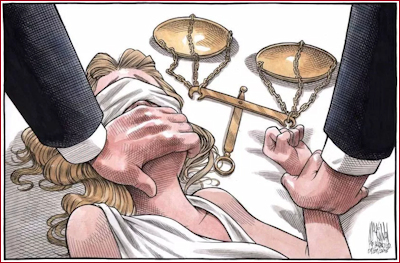
 ne of my main complaints about all the rhetoric touting "social justice" is that most people who use that expression seem to have a patently unbiblical (and therefore unjust) notion of what "justice" entails. Specifically, the suggestion has been made (and seconded) that in order to even the record of past injustices and level the playing field of "privilege," our whole culture (including you and me as individuals) needs to adopt a new kind of favoritism in all the judgments we make.
ne of my main complaints about all the rhetoric touting "social justice" is that most people who use that expression seem to have a patently unbiblical (and therefore unjust) notion of what "justice" entails. Specifically, the suggestion has been made (and seconded) that in order to even the record of past injustices and level the playing field of "privilege," our whole culture (including you and me as individuals) needs to adopt a new kind of favoritism in all the judgments we make. From now on, they say, the scales of justice need to be tipped in favor of certain ethnicities, gender types, and other disadvantaged people groups. Cisgender white males have to go to the back of the bus. Impartiality isn't what's needed. Reparations are.
From now on, they say, the scales of justice need to be tipped in favor of certain ethnicities, gender types, and other disadvantaged people groups. Cisgender white males have to go to the back of the bus. Impartiality isn't what's needed. Reparations are.That mentality has given birth to a dozen or more hashtags, popular fads, and government policies: Affirmative action. Intersectional theory. #BelieveAllWomen. #CheckYourPrivilege. Don't appropriate the symbols of another culture. Don't be colorblind when it comes to ethnic differences. And whatever you do, don't say #AllLivesMatter. That's now racist.
Note what all those ideas have in common: they spurn even-handed impartiality. In other words. what's happening in the name of racial reconciliation and social justice is the very definition of injustice, because it's a shameless prescription for prejudice.
And again: rigorous impartiality is the sine qua non of true justice.
Scripture says, "You shall not be partial in judgment. You shall hear the small and the great alike" (Deuteronomy 1:17). "You shall do no injustice in court. You shall not be partial to the poor or defer to the great, but in righteousness shall you judge your neighbor" (Leviticus 19:15). "You shall not fall in with the many to do evil, nor shall you bear witness in a lawsuit, siding with the many, so as to pervert justice, nor shall you be partial to a poor man in his lawsuit" (Exodus 23:2-3).
This is basic biblical truth. It's definitional of justice. And it's stressed in Scripture from start to finish: "If you show partiality, you are committing sin and are convicted by the law as transgressors" (James 2:9).
So it's particularly annoying when evangelical virtue-signallers try to pretend they are upholding some vital principle of biblical justice by embracing the wider culture's currently-stylish hierarchy of intersectional victimology; or by binding heavy burdens of blame and scorn on people for their ancestors' wrongdoings; or by telling brothers to shut up because they belong to a "privileged" ethnicity or people group; or by acting as if the oppression suffered by one's forebears bestows a kind of gnostic enlightenment on a person, thereby giving him an automatically superior understanding of social issues; or by shifting the burden of proof in abuse cases from the accuser to the accused; or by refusing to acknowledge that the wider culture's determination to glorify victimhood has resulted in a epidemic of false abuse claims.
Here's a sample of the kind of thing that gets Tweeted and re-Tweeted endlessly in the evangelical districts online. (And by the way—I just screen-grabbed a random sample of what I've seen today. I'm not looking to single out the person who wrote this Tweet or any of the hundred-plus people who retweeted it before I even saw it, so let's keep it anonymous):
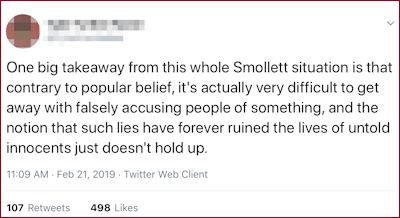
Seriously?
 It would be much more plausible to say that the chief takeaway from the Jussie Smollett incident is that victimhood has become such a desirable status in American culture that even this highly privileged Hollywood celebrity faked a racist attack in a desperate attempt to win whatever extra advantages he thought he could get from the intersectional lottery.
It would be much more plausible to say that the chief takeaway from the Jussie Smollett incident is that victimhood has become such a desirable status in American culture that even this highly privileged Hollywood celebrity faked a racist attack in a desperate attempt to win whatever extra advantages he thought he could get from the intersectional lottery.Furthermore, Smollett's failure to pull it off was owing to his own ineptitude. It does not prove that it's "difficult to get away with" such a prank. On the contrary, the initial reactions to Smollett's claims revealed once again how ridiculously easy it is to gain widespread sympathy with a hate-crime hoax—even from people who ought to know better.
I need to say one other thing about that Tweet: I don't see how minimizing the damage to the life and reputation of someone falsely accused of a crime is morally any better than trying to excuse or downplay any other kind of abuse. I wonder, for example, what Justice Kavanaugh or the Duke lacrosse team or Paul Nungesser or Brandon Winston—or who knows how many other lesser-known people in similar straits—would think of the last clause of the above Tweet. But among the multitude of evangelicals who "liked" and approved that thoughtless remark were at least one or two evangelicals who are well known as victims' advocates.
It illustrates how seriously skewed evangelical attitudes are in the way we speak and think about justice these days. After my earlier post decrying both spiritual abuse and false accusations, I was hit with a barrage of emails and Tweets scolding me for saying that every accusation of sexual or spiritual abuse needs to be impartially and painstakingly investigated. Worse yet, by keeping the burden of proof on the accuser and not the accused, they said, I was in effect siding with abusers and enabling abuse, whether I intended to or not.
Evidently lots of evangelicals now believe that to maintain the presumption of innocence in an abuse case is an automatic injustice tantamount to shelling the accuser with a whole new bombardment of abuse.
But again, the biblical standard of justice is not the least bit ambiguous, and it starts with an uncompromising commitment to impartiality. True justice cannot favor poor or rich, accuser or accused, Jew or Gentile, female or male, weak or powerful. It abhors false accusations as passionately as it detests the abuse of widows and orphans. It sees every form of "mob justice" as gross injustice. It tolerates no excuses for evil behavior. (Even bona fide victims are not given a pass for their sin.) It stubbornly insists on every duty under God's law and holds every individual to the principle of personal responsibility before God as the Judge of all the earth. "You therefore must be perfect, as your heavenly Father is perfect" (Matthew 5:48). That's what real justice demands.
In other words, justice as Scripture describes it is a reflection of God's own holy and righteous character. And yes, it is therefore fundamentally and permanently at odds with this fallen, cursed world's notions about justice.
So if you find yourself echoing talking points about abuse, victimhood, privilege, oppression or other social-justice topics that you've picked up from the secular academy, the mainstream media, American civil religion, Oprah Winfrey, the Southern Poverty Law Center, the Masonic Lodge, the Tea Party collective, or any other worldly source, maybe you ought to give the biblical treatment of those topics a little more careful study.



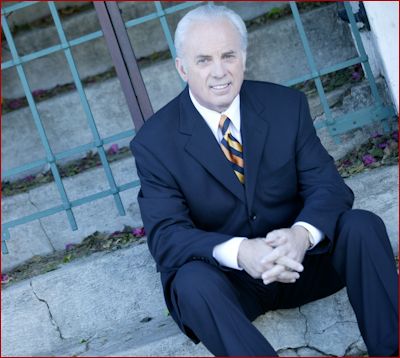
 hen most of us think of John MacArthur we think of the precision of his preaching and the care with which he has handled God's word. We think of the courage he has displayed in interviews with Larry King and more recently Ben Shapiro as he has boldly declared unvarnished biblical truth and yet done so with love and compassion. All of these things are true.
hen most of us think of John MacArthur we think of the precision of his preaching and the care with which he has handled God's word. We think of the courage he has displayed in interviews with Larry King and more recently Ben Shapiro as he has boldly declared unvarnished biblical truth and yet done so with love and compassion. All of these things are true.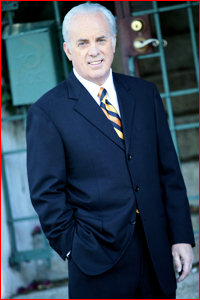 Now, lest you think I am giving him undue accolades, I understand theologically that none of us as believers does anything with 100% pure motives. We live in a fallen world with fallen bodies, fallen wills, and fallen motives. Yes, we are new creatures in Christ; the old things have passed away and new things have come (2 Corinthians 5:17). Our hearts of stone have been graciously and sovereignly replaced with hearts of flesh (Ezekiel 36:26). But within every believer resides rebel outposts of sin that not even the most godly among us can completely put to death this side of glorification (Romans 7). John MacArthur is not an exception to this; a reality, I have no doubt, he would be the first to confirm.
Now, lest you think I am giving him undue accolades, I understand theologically that none of us as believers does anything with 100% pure motives. We live in a fallen world with fallen bodies, fallen wills, and fallen motives. Yes, we are new creatures in Christ; the old things have passed away and new things have come (2 Corinthians 5:17). Our hearts of stone have been graciously and sovereignly replaced with hearts of flesh (Ezekiel 36:26). But within every believer resides rebel outposts of sin that not even the most godly among us can completely put to death this side of glorification (Romans 7). John MacArthur is not an exception to this; a reality, I have no doubt, he would be the first to confirm.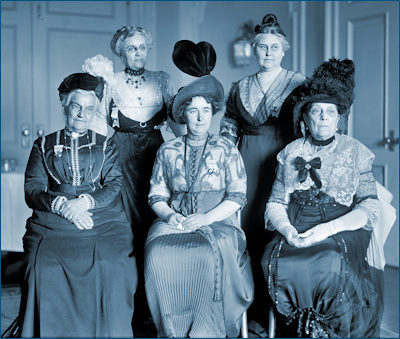
 t will come as a surprise to some to learn that the
t will come as a surprise to some to learn that the  What triggered this chorus of complainers and their misguided manifestos? Of all things, it was the announcements of the guest speakers at last month's G3 Conference and the upcoming Shepherds' Conference. Both events feature speakers who, to varying degrees, have personally promoted the popular doctrines of the social justice movement in the church (or have expressly supported those who do).
What triggered this chorus of complainers and their misguided manifestos? Of all things, it was the announcements of the guest speakers at last month's G3 Conference and the upcoming Shepherds' Conference. Both events feature speakers who, to varying degrees, have personally promoted the popular doctrines of the social justice movement in the church (or have expressly supported those who do).
 At the very least, can't you holster your weapons and wait for an actual offense to take place before writing off the man altogether? Does a half century of integrity and faithfulness—not to mention the personal spiritual influence you profess he has had on you—not merit at least some measure of circumspect restraint? Doesn't love hope for the best rather than presume the worst?
At the very least, can't you holster your weapons and wait for an actual offense to take place before writing off the man altogether? Does a half century of integrity and faithfulness—not to mention the personal spiritual influence you profess he has had on you—not merit at least some measure of circumspect restraint? Doesn't love hope for the best rather than presume the worst?

 This is a true statement, taken right out of Gen. 1:26-28. But don't miss how Wilson's embrace of evolutionary creationism places himself in a real pickle as a result of this thesis. Evolutionary creationists cannot say that the version of humans we see today are the ones made in God's image. Why not? Because evolution presumes the human species, like all species, is constantly progressing to a more highly developed form through environmental adaptation. In an evolutionary paradigm, every species is always evolving to a higher order of being, and this must also include humans. Thus, for the evolutionary creationist, there is no way around this dilemma: either humans are never quite made in God's image, because they continue to evolve, or they are made in God's image because God is evolving just as they are. Both are profoundly unbiblical perspectives.
This is a true statement, taken right out of Gen. 1:26-28. But don't miss how Wilson's embrace of evolutionary creationism places himself in a real pickle as a result of this thesis. Evolutionary creationists cannot say that the version of humans we see today are the ones made in God's image. Why not? Because evolution presumes the human species, like all species, is constantly progressing to a more highly developed form through environmental adaptation. In an evolutionary paradigm, every species is always evolving to a higher order of being, and this must also include humans. Thus, for the evolutionary creationist, there is no way around this dilemma: either humans are never quite made in God's image, because they continue to evolve, or they are made in God's image because God is evolving just as they are. Both are profoundly unbiblical perspectives. 

 Why was Paul so incensed at arguments and lofty opinions raised against what God has said in His Word? Because false teaching in one area has a way of spreading to all areas, and with false teaching comes proclivity to sin; the book of Jude lays this out plainly. Because of this, Paul writes to that same church in Corinth, "Who is made to fall (i.e. drawn into sin), and I am not indignant?" (2 Cor. 11:29b). According to Paul, righteous indignation in the face of false teaching is the appropriate and indeed, biblically prescribed reaction for those who would establish themselves as true followers of Christ. As Pastor John MacArthur has said, one sign of Christian maturity is when God is dishonored and you feel the insult. Now obviously, not every theological difference is a polemical hill on which to die. But as we have already established with Thesis #1 in Part 1, the issues at stake if a literal, historical view of Genesis 1-2 is surrendered are comprehensively devastating to the Christian faith. This is why, on the issue of creationism versus evolution, the admonition of Paul pertains: " . . . the Lord's servant must not be quarrelsome but kind to everyone, able to teach, patiently enduring evil, correcting his opponents with gentleness. God may perhaps grant them repentance leading to a knowledge of the truth, and they may come to their senses and escape from the snare of the devil, after being captured by him to do his will" (2 Tim. 2:24-26).
Why was Paul so incensed at arguments and lofty opinions raised against what God has said in His Word? Because false teaching in one area has a way of spreading to all areas, and with false teaching comes proclivity to sin; the book of Jude lays this out plainly. Because of this, Paul writes to that same church in Corinth, "Who is made to fall (i.e. drawn into sin), and I am not indignant?" (2 Cor. 11:29b). According to Paul, righteous indignation in the face of false teaching is the appropriate and indeed, biblically prescribed reaction for those who would establish themselves as true followers of Christ. As Pastor John MacArthur has said, one sign of Christian maturity is when God is dishonored and you feel the insult. Now obviously, not every theological difference is a polemical hill on which to die. But as we have already established with Thesis #1 in Part 1, the issues at stake if a literal, historical view of Genesis 1-2 is surrendered are comprehensively devastating to the Christian faith. This is why, on the issue of creationism versus evolution, the admonition of Paul pertains: " . . . the Lord's servant must not be quarrelsome but kind to everyone, able to teach, patiently enduring evil, correcting his opponents with gentleness. God may perhaps grant them repentance leading to a knowledge of the truth, and they may come to their senses and escape from the snare of the devil, after being captured by him to do his will" (2 Tim. 2:24-26). Dr. Eakin is a sports medicine orthopædic surgeon in the Bay Area and part time teacher at Grace Bible Fellowship Church's Stanford campus ministry. He is the author of
Dr. Eakin is a sports medicine orthopædic surgeon in the Bay Area and part time teacher at Grace Bible Fellowship Church's Stanford campus ministry. He is the author of 








